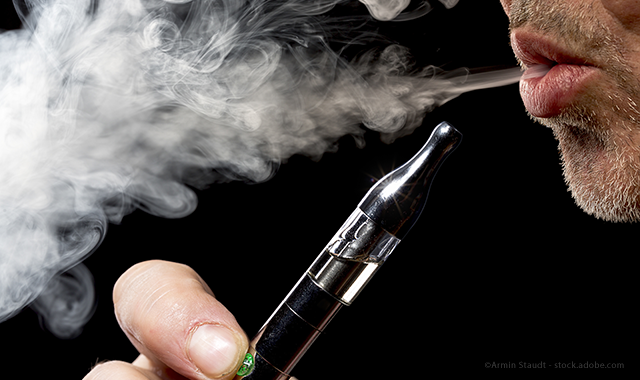Study finds sweet e-cigarettes can increase risk of dental cavities

A new research study has determined that vaping sweet e-cigarettes can increase the risk of dental cavities.
The study investigated changes in cariogenic potential when tooth surfaces were exposed to certain e-cigarette aerosols in a controlled environment. The combination of the viscosity of e-cigarette liquids and some classes of chemicals in sweet flavors contribute to the increase, according to the lead researcher Jeffrey Kim, DDS, Ph.D.
Scientists systematically evaluated e-cigarette aerosols and found that the aerosols have similar physio-chemical properties to high-sucrose, gelatinous candies and acidic drinks, and interact with hard tissues of the oral cavity in such a way that can adversely affect teeth. Among more than 400 available e-liquid brands, 84 percent offered fruit flavors and 80 percent offered candy and dessert flavors, according to tobaccofreekids.org.
Read more: E-cigarettes shown to be detrimental to oral health
“This study will give dentists further information to help educate patients that using e-cigarettes can have detrimental effects on their mouths,” says Thomas Hart, DDS, Ph.D., senior director of the ADA Foundation Volpe Research Center.

The study suggests the complex impact of e-cigarettes on human health goes beyond respiratory and cardiac systems and may have significant implications on oral health.
“[FDA has] data to show that use of e-cigarettes, while potentially posing much less harm than combusting tobacco, is not benign. It causes its own health effects … [Youth e-cigarette prevention] may be the most important thing I can accomplish in my role as the agency’s commissioner,” says FDA Commissioner Scott Gottlieb, MD, in a statement released by the U.S. Food and Drug Administration.
The study was supported by the ADA Foundation and published in PloS One, a peer-reviewed open access scientific journal published by the Public Library of Science since 2006.
Scientists from the following organizations participated in the study: ADA Foundation Volpe Research Center; Department of Chemical and Biological Engineering, University of Colorado Boulder; National Institute of Standards and Technology; Molecular Characterization and Analysis Complex, University of Maryland; Johns Hopkins University; and the Department of Chemistry and Biochemistry, University of Maryland.